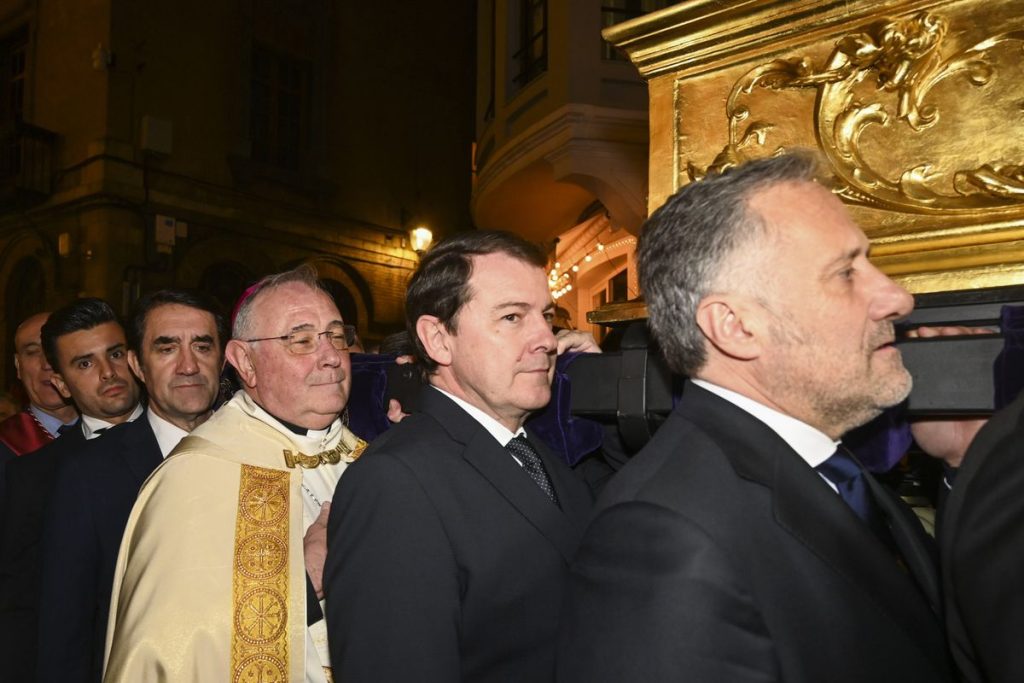The PP and Vox parties in Castilla y León have announced a proposed law to promote a “Concord” norm in the community against a “biased and sectarian” view of history. The partners of the Junta, with Alfonso Fernández Mañueco (PP) supported by Juan García-Gallardo (Vox), agreed on this measure in the legislative agenda established in April 2022 when Mañueco retained his position thanks to the far right after parting ways with Ciudadanos. Vox had been concerned about the delay, seeing one of their main ideological slogans fulfilled. The PP spokesperson, Raúl de la Hoz, has emphasized that they are not comparing the Second Republic, the Civil War, and the Franco dictatorship, but rather referring to “all victims” equally; Vox’s spokesperson, Carlos Menéndez, has advocated for an “objective treatment of all political victims from 1931 to 1978”. The text does not mention the dictatorship or make any reference to Francoism beyond stating that “there has never been a consensus narrative on the Second Republic, the Civil War, and Francoism”.
The press conference took place during Holy Week, with little media focus due to holidays and religious celebrations. Both representatives attended a press conference at the Castilla y León Parliament in Valladolid to present the new law, which replaces the Historical and Democratic Memory decree signed in 2018 by the PP under Juan Vicente Herrera. Menéndez proclaimed that the new regulation “is not ideological, does not divide, respects all victims without distinguishing them by their aggressors, giving them equal treatment. It puts an end to a biased and sectarian view of history, unbecoming of a democratic regime, but of a totalitarian regime.” The far-right politician insisted that history “should be left for study and interpretation by historians” and that an “objective treatment of all political victims from 1931 onwards” should be provided. However, he considered that the Civil War and the Dictatorship are “historiographically interrelated”, not “historically”, with the Second Republic.
De la Hoz has emphasized that they are “not comparing the Dictatorship and the Republic” and have advocated for giving an “equal treatment to the victims without evaluating that period”. He also defended the new text for its “competential and organic” adaptation to national legislation, which he described as a “frontist law against reconciliation” that both parties seek with this idea of Concordia. The proposal establishes itself as “a testimony of commitment to honor and protect the history of Spain from 1931 to 1978, a period that has witnessed profound political, social, and cultural transformations that have marked the course and identity of Spain, thus recognizing those who suffered persecution or violence for ideological, religious, and social reasons”.
The announcement comes after almost two years of negotiation between the PP and Vox, with occasional criticism from Mañueco’s partner for the delay in implementation. The president unveiled this project on the day of his investiture supported by the votes of the group led by Juan García-Gallardo. He promised “legislation on concord that will integrate all regulations in the matter with the purpose of serving as an element of reconciliation and preventing the use of history to divide Spaniards”, messages that are common in his parliamentary ally’s discourse. This clashed with the usual style of the PP in Castilla y León, which has traditionally been inclined towards restoration after the uprising and Francoist repression, as reflected in the 2018 Historical Memory decree when Juan Vicente Herrera governed alone.
Gallardo has insisted from the beginning on his ideological project: “We are going to stop using history to divide Spaniards. That decree does not contribute to this and will be replaced by a decree of concord. We cannot deprive people of their memory. There cannot be a decree of concord that treats everyone equally and a historical memory decree that only talks about one side.” These words were spoken in 2022, at the beginning of the frequent occasions when the PP has had to tone down the bravado of its partner. On that occasion, the conservative spokesperson in the Parliament, Raúl de la Hoz, reiterated that the new provision “will not limit anyone’s rights regarding the contents of the decree” in a land with more than 500 common graves located with over 7,000 victims. The months without progress in the decree’s processing had unsettled the far-right group, with several messages urging their partner to expedite processes, although Gallardo recently stated that there would be news soon.


